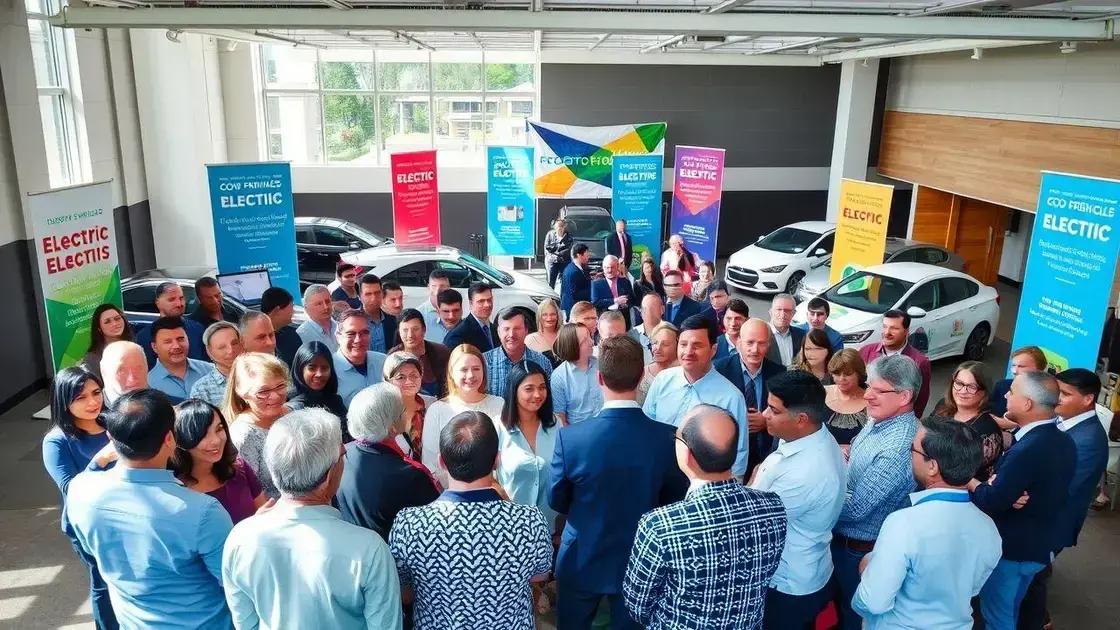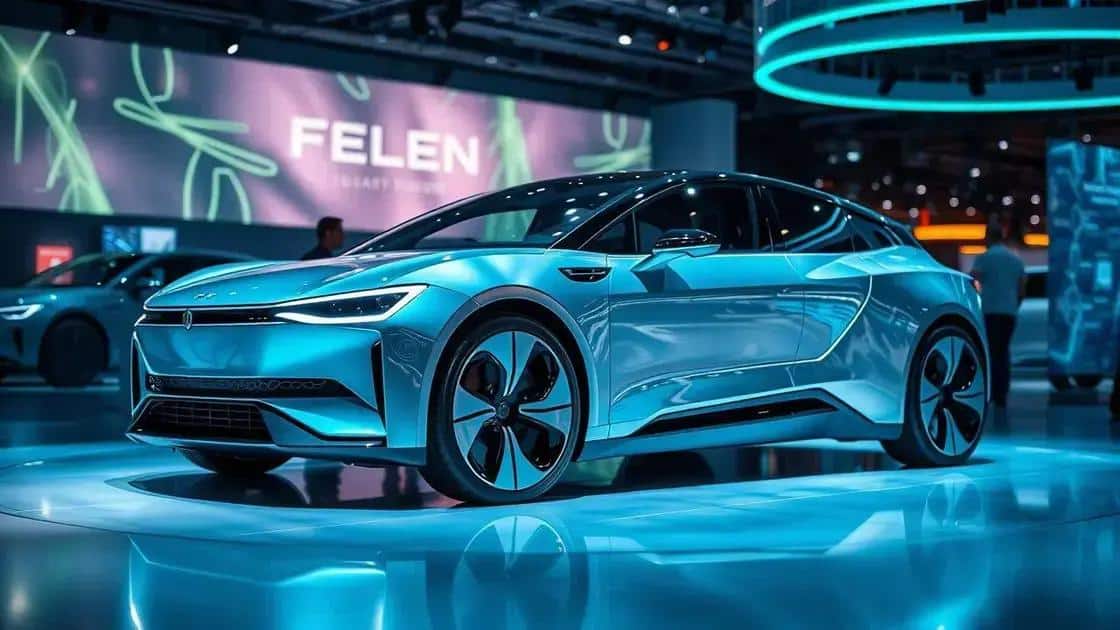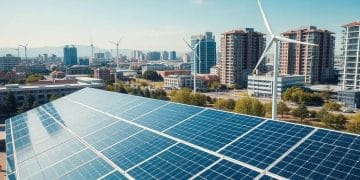Electric vehicle news trends: what to watch in 2023

Electric vehicle news trends highlight advancements in battery technology, smart connectivity features, and increased sustainability efforts, driving consumer adoption and reshaping the automotive industry for a more eco-friendly future.
Electric vehicle news trends are transforming the way we think about transportation. With technology evolving rapidly, it’s crucial to stay updated on what these changes mean for us. Ever wondered how it affects your commute or the environment?
Current trends in electric vehicle technology
The landscape of electric vehicle technology is changing rapidly, with new innovations constantly emerging. Current trends in electric vehicle technology indicate a shift towards more sustainable solutions and advanced features that benefit consumers and the environment.
Battery Improvements
One major area of focus is battery technology. Lighter and more efficient batteries are being developed to enhance vehicle performance. With quicker charging times and longer ranges, these advancements are making electric vehicles more appealing than ever.
- Solid-state batteries are becoming a reality.
- Faster charging stations are being established widely.
- Improved energy density leads to longer driving ranges.
Additionally, automakers are investing heavily in research. They aim to increase the lifespan of batteries while reducing their environmental impact. Innovations like recycling old batteries are also on the rise, promoting a circular economy.
Integration of AI and Connectivity
Another important trend is the integration of artificial intelligence (AI) in electric vehicles. This technology enhances user experience and safety features by providing real-time data analysis. Smart infotainment systems and autonomous driving capabilities are becoming standard offerings in many new models.
- Advanced driver-assist systems improve safety.
- Connectivity allows for remote vehicle diagnostics.
- Continuous software updates enhance vehicle performance.
These features not only improve functionality but also enrich the driving experience. As consumers become more tech-savvy, the demand for these smart features is expected to rise significantly.
In conclusion, the current trends in electric vehicle technology highlight a promising future. With advancements in battery technology and the integration of artificial intelligence, consumers can look forward to more efficient, safer, and smarter vehicles on the road.
Impact of government policies on EV adoption

The impact of government policies on EV adoption is crucial in shaping the electric vehicle market. Various initiatives by governments worldwide are fostering the growth of this industry, making it essential to understand how these regulations work.
Incentives and Subsidies
Many governments offer incentives to promote electric vehicle sales. These incentives include tax credits, rebates, and reduced registration fees. Such financial support encourages consumers to consider purchasing electric vehicles instead of traditional gas-powered cars.
- Tax credits reduce the overall cost of EVs.
- Rebates are available at the point of sale.
- Some areas have reduced tolls and parking fees for electric vehicles.
As these policies make EVs more affordable, they help boost sales, leading to higher market penetration.
Regulatory Standards
Another important aspect is regulatory standards concerning emissions. Governments have established strict emission targets that automakers must meet. These regulations push manufacturers to invest in EV technology to comply with the new standards. As a result, electric vehicles are being developed at a faster pace than before.
- Emission targets encourage cleaner technologies.
- Regulations may include deadlines for phasing out gas vehicle sales.
- Manufacturers face penalties for non-compliance.
These standards not only motivate automakers to innovate but also increase public awareness about environmental concerns tied to vehicle emissions.
Ultimately, the impact of government policies on EV adoption is significant. By providing incentives and establishing regulatory frameworks, governments play a vital role in accelerating the transition to electric vehicles, driving a sustainable future.
Consumer preferences and market shifts
Understanding consumer preferences and market shifts is essential in the electric vehicle (EV) industry. As awareness of environmental issues increases, more consumers are interested in alternatives to traditional vehicles.
Shifts in Preferences
Today’s consumers prioritize sustainability in their purchases. Many are willing to pay a premium for electric vehicles that align with their values. Features like zero emissions, energy efficiency, and eco-friendly materials are becoming crucial factors in their buying decisions.
- Interest in hybrid and fully electric options is growing.
- Advanced technology in EVs attracts tech-savvy buyers.
- Brand reputation for sustainability influences choices.
Moreover, the availability of charging infrastructure and incentives from governments significantly impacts consumer choices. People are more likely to consider EVs when charging stations are easily accessible.
Market Trends
With the rise of electric vehicles, automakers are shifting their focus and resources toward developing new EV models. This change is visible in the announcement of new models that cater to various market segments, from luxury vehicles to affordable options for everyday consumers. As more choices become available, consumers benefit from increased competition and innovation.
- More automakers are committing to 100% EV lineups.
- Emerging brands are entering the market with unique offerings.
- Partnerships for battery technology improvements are on the rise.
This transition also encourages traditional car manufacturers to rethink their strategies. Established companies are investing heavily to catch up and meet the growing demand for electric vehicles.
In summary, the preferences of consumers and the shifts in the market are reshaping the automotive landscape. As more individuals seek out sustainable options, the industry adapts to meet these new needs.
Future innovations in electric vehicles

The future innovations in electric vehicles are set to change the automotive landscape significantly. As technology advances, electric vehicles (EVs) are expected to become more efficient, sustainable, and user-friendly.
Battery Technology Advancements
One of the most exciting areas of innovation is battery technology. Future EVs will likely use solid-state batteries, which promise quicker charging times and greater energy density. This means longer ranges on a single charge, addressing one of the main concerns of EV owners.
- Solid-state batteries could enhance safety.
- Fast charging options will be available at more stations.
- Lighter batteries will improve overall vehicle efficiency.
These developments will make electric vehicles much more attractive to consumers, encouraging further adoption.
Smart and Connected Features
Another trend is the integration of smart technology in electric vehicles. Future models will likely feature advanced infotainment systems and connectivity options, allowing vehicles to sync with our daily lives.
- Vehicles will have real-time data analytics for better efficiency.
- Remote monitoring and diagnostics will enhance user experience.
- Over-the-air updates will keep software current without visits to the dealership.
Such innovations aim to make the driving experience safer and more enjoyable, responding to consumer demands for technology in transport.
Furthermore, future EVs will prioritize sustainability not just in driving but in manufacturing processes as well. Automakers are exploring ways to use recycled materials extensively and reduce waste in their production lines. This sustainable approach will resonate with environmentally-conscious consumers.
The combination of enhanced battery technology, smart features, and sustainable practices will revolutionize the electric vehicle industry, making EVs not just a choice but a preferred solution for future mobility.
In summary, the electric vehicle industry is on the brink of a transformative era. Key innovations in battery technology, connectivity, and sustainability are paving the way for a cleaner, smarter future. As consumers show greater interest in eco-friendly transportation options, manufacturers are responding with exciting advancements and models that meet these demands. The road ahead looks promising, with electric vehicles becoming a central part of our daily lives and helping to create a more sustainable world.
FAQ – Frequently Asked Questions about Electric Vehicles
What are solid-state batteries and why are they important?
Solid-state batteries offer faster charging times and higher energy density, making them crucial for improving electric vehicle performance and range.
How do smart technologies enhance the driving experience in EVs?
Smart technologies provide real-time data, diagnostics, and connectivity features, making driving safer and more convenient for users.
What sustainability practices are manufacturers adopting?
Manufacturers are increasingly using recycled materials and sustainable production methods to reduce their impact on the environment.
Why are more consumers choosing electric vehicles?
Consumers are drawn to electric vehicles due to their environmental benefits, lower operating costs, and the availability of various models and technology features.






